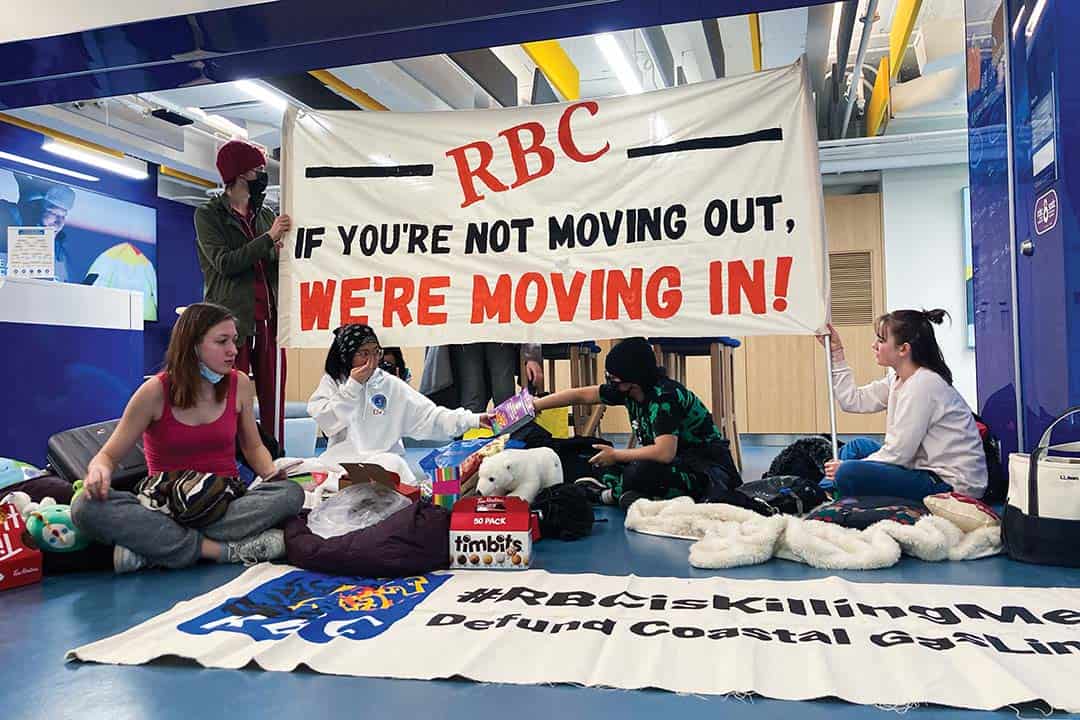On March 2, Climate Justice UofT held a sit-in outside of the University of Toronto Students’ Union (UTSU) Student Commons’ Royal Bank of Canada (RBC) On Campus branch. The student activist group protested UTSU’s connection with the bank.
The protest occurred as part of a nationwide day of action, during which students at 12 Canadian universities held events calling on RBC to stop funding fossil fuels and, in particular, the Coastal GasLink Pipeline. In light of the protest, the RBC branch closed for the day.
The protest
Around 11:00 am, a group of students from Climate Justice UofT entered the UTSU Student Commons. Approximately 15 students displayed large banners and sat in front of the RBC On Campus location.
As RBC is one of the largest investors in the Coastal GasLink pipeline, which crosses Wet’suwet’en land, the protesters projected videos featuring speeches by First Nations people condemning the pipeline. Although some elected First Nations governments signed agreements with the company constructing the pipeline, many hereditary chiefs — who are the nation’s authorities, according to both Wet’suwet’en law and a 1997 ruling by the Supreme Court of Canada — oppose the project, expressing concerns about the pipeline’s environmental effects.
In response to a November 2022 protest in Nova Scotia against RBC’s funding of the pipeline, the bank told Global News that they support energy projects developed in a socially and environmentally responsible manner and “strive to be the leading financial institution in Canada to work with Indigenous people towards reconciliation.”
Around 12:00 pm, Special Constables arrived at the Student Commons and asked protesters to move a few feet away from the branch. RBC employees closed the space, while students continued to sit outside. Throughout the day, a few people trickled into the Commons. Protesters offered pizza and asked them to sign a petition demanding that the UTSU “phase out” their connections to RBC.
The organizers of the protest also spoke with the UTSU General Manager, who offered to provide the protesters with food or chairs. The protestors declined. They remained in the building until 5:00 pm, when the Commons closed for the day. Climate Justice UofT organized the event as part of a campaign by Banking on a Better Future, a group of youth across Canada advocating for banks to divest from fossil fuels. Students at 12 universities in British Columbia, Alberta, and Ontario staged protests calling on RBC to stop providing funds to fossil fuel companies and demanding that their respective universities sever ties with RBC until the bank divests. Nine of these protests took place at RBC On Campus branches.
Demands
In an interview with The Varsity, Kate Martens, Climate Justice UofT’s spokesperson for the protest, noted that RBC is the largest funder of fossil fuel companies in Canada and the fifth-largest funder worldwide. A November 2022 report by Stand.earth — a group of researchers and policy experts investigating climate and environmental issues — found that, within the first nine months of 2022, RBC provided more than nine billion USD in loans and underwriting to fossil fuel companies currently expanding coal, oil, and gas infrastructure.
In September 2022, the Competition Bureau, which is an independent law enforcement agency, opened an inquiry into RBC’s environmental marketing after a group of individuals submitted a complaint accusing the bank of making misleading claims about their environmental commitments. In a statement to the Financial Post, RBC rejected these claims, writing that the complaint was “unfounded and not in line with Canada’s climate plan.”
Martens highlighted RBC initiatives, including green grants and environmental events at U of T, that she described as greenwashing — companies advertising themselves as environmentally conscious despite a lack of action. “Banks are smart — they know that when a student joins a bank, they’re with them for life,” said Martens. “They’re trying to target students, get students to join them, and I think most students at U of T would agree that they don’t want their money to be invested in fossil fuels.” Martens suggested that students bank with credit unions to avoid placing their money in banks that use customers’ savings to fund fossil fuel companies.
Referring to the bank’s funding of the Coastal GasLink pipeline, Martens said that hosting an RBC branch within the Student Commons serves as “a reminder to students, and especially Indigenous students, [of] the atrocities that the RBC is currently committing.”
Climate Justice UofT presented several demands directed at the UTSU. They called on the union to release a statement condemning RBC’s contributions to climate change, open up a pilot account with a credit union, and release a report on the feasibility of fully transitioning from banking with RBC. They also demanded that the union publish a policy prohibiting RBC from funding UTSU activities and events and publicly disclose the details of their contract with RBC on the campus branch.
Responses from the UTSU and RBC
In an email to The Varsity, UTSU President Omar Gharbiyeh thanked the students who participated in the protest, highlighting their thoughtfulness in crafting their demands. “Moments like these are really important opportunities for us to connect with our membership, and we look forward to continuing to work with Climate Justice U of T to explore our options and represent students as best as we can.”
According to Gharbiyeh, the UTSU will discuss Climate Justice UofT’s demands over the next few days and provide a full response in the near future.
In an email to The Varsity, a spokesperson for RBC highlighted the bank’s environmental goals, including their commitment to achieving net-zero lending by 2050. They wrote, “We are focusing our attention where we will have the biggest impact – helping our clients reduce their emissions and supporting initiatives that bring green solutions to market.” They also affirmed their commitment to supporting responsible energy development “including meaningful consultations with Indigenous peoples.”


